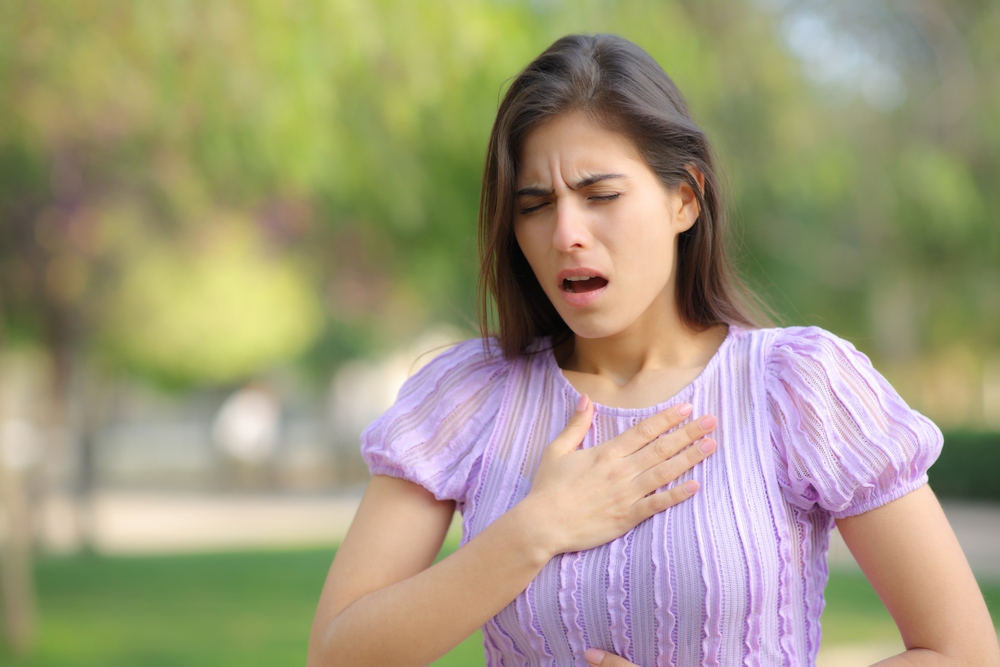Trouble breathing

When your chest feels constricted, your breath is short, or you feel as though you are being suffocated, you have breathing problems.
If you are fat or have just engaged in vigorous exercise, you can have shortness of breath. Extreme temperatures or being at a high altitude might also cause it. If you experience breathing issues for any other reason, it is likely a sign of a medical condition.
Causes
Some people find it difficult to breathe when they are sick. Others experience it as a result of infections like sinusitis. When you have sinusitis, it might be difficult to breathe through your nose for a week or two before the swelling subsides and your clogged sinuses start to drain.
Long-term respiratory issues are common (chronic). Asthma, allergies, and persistent sinusitis are a few of these. They can result in symptoms including chest tightness, itchy or watery eyes, itchy or runny noses, nasal congestion, shallow breathing, coughing, and wheezing.
Viruses and allergens can infiltrate your lungs through your nasal route. So many lung illnesses are frequently related to your nose and sinuses. Attacks of asthma can be brought on by nasal or sinus irritation. And allergens are by far the biggest asthma trigger.
Over 50 million Americans suffer from allergies. Asthma affects 17 million adult Americans. The two frequently occur in tandem. They can make life miserable if not treated.
Smoking impairs the tubes, or "airways," that convey air to your lungs, which results in breathing issues. Additionally, it harms the tiny air sacs in your lungs called "alveoli" that transport oxygen into your blood and expel carbon dioxide (CO2). Breathing difficulties might result from even passive smoking.
Most incidences of lung cancer and chronic obstructive pulmonary disease (COPD) are caused by smoking cigarettes.
Millions of Americans suffer from COPD, which includes emphysema and chronic bronchitis, and causes breathing difficulties. Lung cancer is less frequent and frequently has no symptoms in the first stages. But it can also cause chest pain, back pain, a persistent cough, and breathing difficulties.
Other dangerous conditions include tuberculosis, pneumonia, COVID-19, and lung diseases linked to HIV or AIDS that may also cause breathing issues.
Symptoms
Feeling as though you can't breathe in enough oxygen is the main symptom of breathing issues.
Specific indications include:
- A quicker pace of breathing
- Wheezing
- Blue lips or nails
- A skin tone of gray or pallor
- Increased perspiration and widened nostrils
If you experience sudden breathing problems, call emergency assistance. Anyone whose respiration appears to have significantly slowed down or stopped should seek immediate medical assistance. If you know how to perform emergency CPR, do so after calling 911.
Breathing problems are only one of several signs that can point to a significant issue. These issues might be symptoms of a heart attack, an angina attack, or a shortage of oxygen.
Diagnosis
Breathing issues could have a variety of causes. Anyone who experiences unidentified respiratory difficulties should consult a physician.
The doctor will inquire about any additional symptoms a patient may be having at the appointment. This might be sufficient for the doctor to identify the cause in some circumstances.
In other situations, a doctor might decide to do tests to assist in the diagnosis. These tests could consist of:
- Allergy tests
- Chest X-ray
- Slung tests
- CT scans
- Arterial blood gas analysis
- Spirometry and methacholine challenge tests
Who is at risk?
Depending on what is causing the respiratory issue, different risk factors apply.
Children are more likely to choke than adults, for instance, and smokers are more likely to acquire emphysema. People who have asthma are more likely to experience breathing problems after physical activity or allergen exposure.
Numerous breathing problems that can arise throughout a person's lifetime can be avoided by remaining active and adhering to a healthy, balanced diet.






